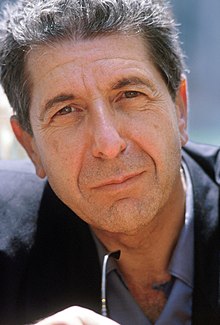
Back Leonard Cohen ACE Leonard Cohen Afrikaans Leonard Cohen AN ليونارد كوهين Arabic ليونارد كوهين ARZ Leonard Cohen AST Leonard Koen Azerbaijani لئونارد کوهئن AZB Leonard Cohen BCL Леанард Коэн Byelorussian
Leonard Cohen | |
|---|---|
 Cohen in 1988 | |
| Born | September 21, 1934 |
| Died | November 7, 2016 (aged 82) Los Angeles, California, US |
| Resting place | Shaar Hashomayim Congregation Cemetery, Montreal, Canada |
| Occupations |
|
| Years active | 1954–2016 |
| Children | 2, including Adam |
| Relatives | Lyon Cohen (grandfather) |
| Musical career | |
| Genres | |
| Instruments |
|
| Discography | Full list |
| Labels | Columbia |
| Website | leonardcohen |
| Signature | |
Leonard Norman Cohen CC GOQ (September 21, 1934 – November 7, 2016) was a Canadian songwriter, singer, poet, and novelist. Themes commonly explored throughout his work include faith and mortality, isolation and depression, betrayal and redemption, social and political conflict, and sexual and romantic love, desire, regret, and loss.[1] He was inducted into the Canadian Music Hall of Fame, the Canadian Songwriters Hall of Fame, and the Rock and Roll Hall of Fame. He was invested as a Companion of the Order of Canada, the nation's highest civilian honour. In 2011, he received one of the Prince of Asturias Awards for literature and the ninth Glenn Gould Prize.
Cohen pursued a career as a poet and novelist during the 1950s and early 1960s, and did not begin a music career until 1966. His first album, Songs of Leonard Cohen (1967), was followed by three more albums of folk music: Songs from a Room (1969), Songs of Love and Hate (1971) and New Skin for the Old Ceremony (1974). His 1977 record Death of a Ladies' Man, co-written and produced by Phil Spector, was a move away from Cohen's previous minimalist sound.
In 1979, Cohen returned with the more traditional Recent Songs, which blended his acoustic style with jazz, East Asian, and Mediterranean influences. Cohen's most famous song, "Hallelujah", was released on his seventh album, Various Positions (1984). I'm Your Man in 1988 marked Cohen's turn to synthesized productions. In 1992, Cohen released its follow-up, The Future, which had dark lyrics and references to political and social unrest.
Cohen returned to music in 2001 with the release of Ten New Songs, a major hit in Canada and Europe. His eleventh album, Dear Heather, followed in 2004. In 2005, Cohen discovered that his manager had stolen most of his money and sold his publishing rights, prompting a return to touring to recoup his losses. Following a successful string of tours between 2008 and 2013, he released three albums in the final years of his life: Old Ideas (2012), Popular Problems (2014), and You Want It Darker (2016), the last of which was released three weeks before his death. His posthumous, fifteenth, and final studio album Thanks for the Dance, was released in November 2019.
In 2023, Rolling Stone ranked him number 103 in their "200 Greatest Singers of All Time" list.[2]
- ^ de Melo, Jessica (December 11, 2009). "Leonard Cohen to Receive Lifetime Achievement Award at 2010 Grammys". Spinner Canada. Archived from the original on July 6, 2011. Retrieved February 24, 2010.
- ^ "The 200 Greatest Singers of All Time". Rolling Stone. January 1, 2023. Archived from the original on January 1, 2023. Retrieved January 3, 2023.